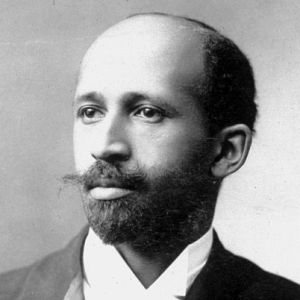W. E. B. Dubois
Following the 1908 race riot at Springfield, Illinois, there was a call from white liberals to form an organization based on the ideals of W. E. B. Dubois’s Niagara movement, which focused on securing “for all people the rights guaranteed in the 13th, 14th, and 15th Amendments to the United States Constitution, which promised an end to slavery, the equal protection of the law, and universal adult male suffrage.” This offspring became the NAACP. “Du Bois was among the founders … and from 1910 to 1934 served it as director of publicity and research, a member of the board of directors, and editor of the Crisis, its monthly magazine.”
The NAACP represented a sea change in African American politics from that of Booker T. Washington who, according to Dubois, asked African Americans to give up “political power… insistence on civil rights… [and] higher education of Negro youth,--and concentrate all their energies on industrial education, the accumulation of wealth, and the conciliation of the South” (704).
Understanding that change helps define Dubois, born on Feb. 23rd, 1868 in Great Barrington, Massachusetts. Greatness came fast for the young man from Massachusetts, graduating valedictorian from his high school in 1884. Graduation from Fisk University followed in 1888. He then took a second bachelor degree in history (cum laude) in 1890 from Harvard University. He eventually received a PHD from Harvard in history in 1895.
Throughout Dubois work carried the common theme of social justice: “[H]e had become convinced that the distinctive artistic traditions, expressive culture, and the communal values of African Americans—what he called the ‘soul’ of the black folk in the United States—had to be recognized, respected, and conserved by white and black Americans alike” (Gates 687). Even his poetry and fiction expressed the ideals of equality.
Dubois left the NAACP in 1934; he left for Atlanta University to work on Black Reconstruction. Although, always a socialist, his left-wing politics became more radical leading to a forced retirement in 1944 from Atlanta University, and his firing from the NAACP in 1948. Dubois died in 1963 in Ghana where he moved to in 1961.
Works Cited:
“NAACP History: W.E.B. Dubois.” WWW.NAACP.org. NACCP, n.d. Web. 10 Aug. 2014.
“NAACP: 100 Years of History.” WWW.NAACP.org. NACCP, n.d. Web. 10 Aug. 2014.
Gates, Henry Louis, and McKay, Nellie Y., eds. The Norton Anthology of African American Literature Second Edition. London: W. W. Norton & Company, Inc. 2004. Print.
Dubois, W. E. B. “The Souls of Black Folk.” The Norton Anthology of African American Literature. New York, NY: Norton, 1997. Print.

The Study of the Negro Problems (1898) The Philadelphia Negro (1899) The Negro in Business (1899) The Souls of Black Folk (1903) The Talented Tenth, second chapter of The Negro Problem, a collection of articles by African Americans (September 1903). Voice of the Negro II (September 1905) John Brown: A Biography (1909) Efforts for Social Betterment among Negro Americans (1909) Atlanta University's Studies of the Negro Problem (1897–1910) The Negro (1915) The Gift of Black Folk (1924) Africa, Its Geography, People and Products (1930) Africa: Its Place in Modern History (1930) Black Reconstruction in America (1935) What the Negro Has Done for the United States and Texas (1936) Black Folk, Then and Now (1939) Color and Democracy: Colonies and Peace (1945) The Encyclopedia of the Negro (1946) The World and Africa (1946) The World and Africa, an Inquiry into the Part Which Africa Has Played in World History (1947) Peace Is Dangerous (1951) I Take My Stand for Peace (1951) In Battle for Peace (1952) Africa in Battle Against Colonialism, Racialism, Imperialism (1960) Articles "An Essay Toward a History of the Black Man in the Great War," The Crisis, vol. 18, no. 2 (June 1919), pp. 63–87. Autobiographies Darkwater: Voices From Within the Veil (1920) Dusk of Dawn: An Essay Toward an Autobiography of a Race Concept (1940) The Autobiography of W. E. Burghardt Du Bois, (1968) Novels The Quest of the Silver Fleece (1911) Dark Princess: A Romance (1928) The Black Flame Trilogy: The Ordeal of Mansart (1957) Mansart Builds a School (1959) Worlds of Color (1961) Archives of The Crisis Du Bois edited The Crisis from 1910 to 1933, and it contains many of his important polemics. Archives of The Crisis at the University of Tulsa: Modernist Journals Collection Archives of The Crisis at Brown University Issues of The Crisis at Google Books Recordings Socialism and the American Negro (1960) W.E.B. DuBois A Recorded Autobiography, Interview with Moses Asch (1961) Dissertations The Suppression of the African Slave Trade to the United States of America: 1638–1870, (Ph.D. dissertation), Harvard Historical Studies, Longmans, Green, and Co. (1896)